Working group
The working group of "Biogenic Char Applications" deals with all questions related to the production, characterization and further application of biogenic char.
Focus topics of the working group:
- Comprehensive characterization of biogenic chars to determine further application areas (e.g. soil improvement, building materials, fuel, etc.)
- Development of new fields of application for biogenic char for further defossilation of the material and energy systems, including development and testing at the technical center
- Investigations into carbon capture possibilities through biogenic char, e.g. as a technical carbon sink
- Production of tailor-made biogenic char from various feedstocks using pyrolysis, torrefaction and pyrolytic combustion depending on the application in adapted plants on a pilot scale and in larger quantities in cooperation with industrial partners
- Techno-economical evaluation and simulation of the production processes and the products examined
The working group works particularly closely with colleagues at the DBFZ on gasification, hydrothermal carbonization, biogenic char use in the biogas context, resource availability and LCA accounting.
Members of the working group
Özge Mutlu received her Ph.D. in chemical engineering in 2017 from Istanbul Technical University, where she worked as a research assistant for more than five years. In her studies she focused on the slow and fast pyrolysis of biomass using different experimental and modelling approaches. During her studies, she was awarded as Jean Monnet scholar and worked as a guest researcher between 2016-2017 in the “Sustainable Process Technology” group at the University of Twente. Her doctoral thesis was recognized as one of the best dissertations of the year at Istanbul Technical University. In 2018, she joined Thermo-chemical Conversion department of DBFZ as researcher. Since May 2024, she leads the working group of “Biogenic Char Applications” focusing on all questions related to the characterization, production, and further application of biochar.
Dennis Krüger studied “Energy and Environmental Technology” at the Technical University Hamburg (TUHH). During his studies, he spent one year at the “Luleå Technical University” located in northern Sweden. Since 2010, he has been working at DBFZ in the department of Thermochemical Conversion. After his diploma thesis in the field of natural draft simulation in small-scale combustion systems, he completed a doctoral scholarship and was subsequently employed as a researcher in the working group of “Demand-based CHP”. He obtained his doctorate (Dr.-Ing.) in the field of micro combined heat and power generation (micro-CHP) using biochar at the Chemnitz University of Technology. He has been leading several national and international projects in which he mostly focuses on process development for heat and biochar production as well as energetic and material use of biochar. He is also very active in developing alternative clean cooking solutions by tailor-made technologies and products for developing regions, especially Africa. Since May 2024, he is working in the working group of “Biogenic Char Applications”.
Andreas Schedl studied “Material and energetic use of renewable resources (NAWARO)” at the University of Natural Resources and Life Sciences, Vienna (BOKU) and at the Technical University of Munich (TUM) and subsequently obtained his doctorate at the BOKU in the Department of Food and Biotechnology at the Institute for Chemistry of Renewable Resources with a focus on biopolymer and paper analysis. He then deepened and expanded his knowledge of the development of new analytical methods, evaluation strategies, statistical experimental design and the associated application of modern digital tools as a post-doc and laboratory manager at the German Center for Integrative Biodiversity Research (iDiv) Halle-Jena-Leipzig in the analysis of secondary metabolites in the Molecular Interaction Ecology working group. Since 2023, he has returned to his original areas of interest with new skills and is working on the production, characterization and application of biogenic carbon compounds in the newly founded working group “Biogenic Char Applications” at the DBFZ.
Betelhem Mekonnen Muluneh is a researcher specializing in soil biogeochemistry, environmental sustainability, and agricultural innovation. Since April 2023, she has been working at the DBFZ in the Thermo-Chemical Conversion Department, actively contributing to the ETH-Soil project, which aims to restore degraded soils in Ethiopia by developing and applying biochar-based biofertilizers. Previously, she was a research associate at Martin-Luther-University Halle-Wittenberg, where she investigated the impact of human activity on fire history and vegetation changes in Ethiopia’s Bale Mountains. This research utilized isotope analysis, biomarker studies, and climate and vegetation reconstruction to better understand the region’s environmental history. Holding a Ph.D. in Soil Biogeochemistry from Martin-Luther-University Halle-Wittenberg, along with a background in Plant Biology and Dryland Crop Sciences, she has experience in paleoenvironmental studies, soil science and sustainable agriculture. In addition to research, she has worked as a lecturer and technology transfer coordinator in Ethiopia. She focuses on developing sustainable solutions for soil restoration and agricultural resilience, particularly in areas affected by environmental degradation and food insecurity. Since March 2025, she has been working as a research associate in the "Biogenic Char Applications" working group.
Rafiandy Dwi Putra completed his M.Sc. in “Sustainable Energy Supply” at RWTH Aachen University with a focus on thermochemical treatment of biomass and waste. In his master thesis, he investigated the utilization of agricultural residues for the production of granular activated carbon through pyrolysis and thermal activation process. After his graduation, he returned to Indonesia and contributed to support the energy transition agenda in Indonesia. In 2023, he joined Thermochemical Conversion Department of DBFZ as a researcher. His research focuses on the industrial application of solid products from thermochemical processes of biogenic residues. Since May 2024, he has been assigned to the working group “Biogenic Char Applications”, where he deepens his research on the topic of biochar and pyrolysis gas utilization in steel production.
Kassé Jean Hugues Angbé holds a Master’s degree in bioenergy, biofuels, and green hydrogen technology, awarded through the West African Science Service Centre on Climate Change and Adapted Land Use (WASCAL) in 2023, under the sponsorship of the German Federal Ministry of Education and Research (BMBF). Since 2021, he has been actively volunteering with youth-focused NGOs. He is currently pursuing a Ph.D. in the department of Thermochemical Conversion at the Deutsches Biomasseforschungszentrum (DBFZ) and the University of Rostock. His research is dedicated to advancing the use of biochar from crop residues, particularly cocoa waste, with a focus on sustainable practices in the West African context.
Anjitha Kuriakose completed her Bachelor’s degree in Civil Engineering at APJ Abdul Kalam Technological University Kerala, India between in 2019. She is currently pursuing her Master’s degree in Biomass Technology at the Technical University of Munich. Between 2022-2023, she was in Vienna, in Natural Sciences at BOKU University as part of an Erasmus program. Currently, she is working on her Master’s thesis focusing on developing a biogas burner in collaboration with DBFZ in the working group “Biogenic Char Applications”. Alongside her thesis, she is also a student assistant (HiWi) in the HeRoTogo project at DBFZ.
Carsten Tilch has been working as a technician in the department of Thermo-chemical Conversion since 2008. Since then, he has been involved in various projects and initiatives with different focuses. These include supporting to set up a DAkkS-accredited testing centre of emissions measurement from solid fuel combustion systems. Based on this experience, he has contributed to shape and evaluate new standards such as the Blue Angel for fireplaces. Part of his work is the calibration and maintenance of measuring devices and sensors for conducting tests in the test equipment laboratory. He also plans and builds test benches and setups for combustion tests and carries out the tests at DBFZ or field measurement sites. The spectrum of materials and technologies examined ranges from a variety of fuels to fireplaces, boilers, fluidized bed combustion systems, dust separators and heat pumps.

